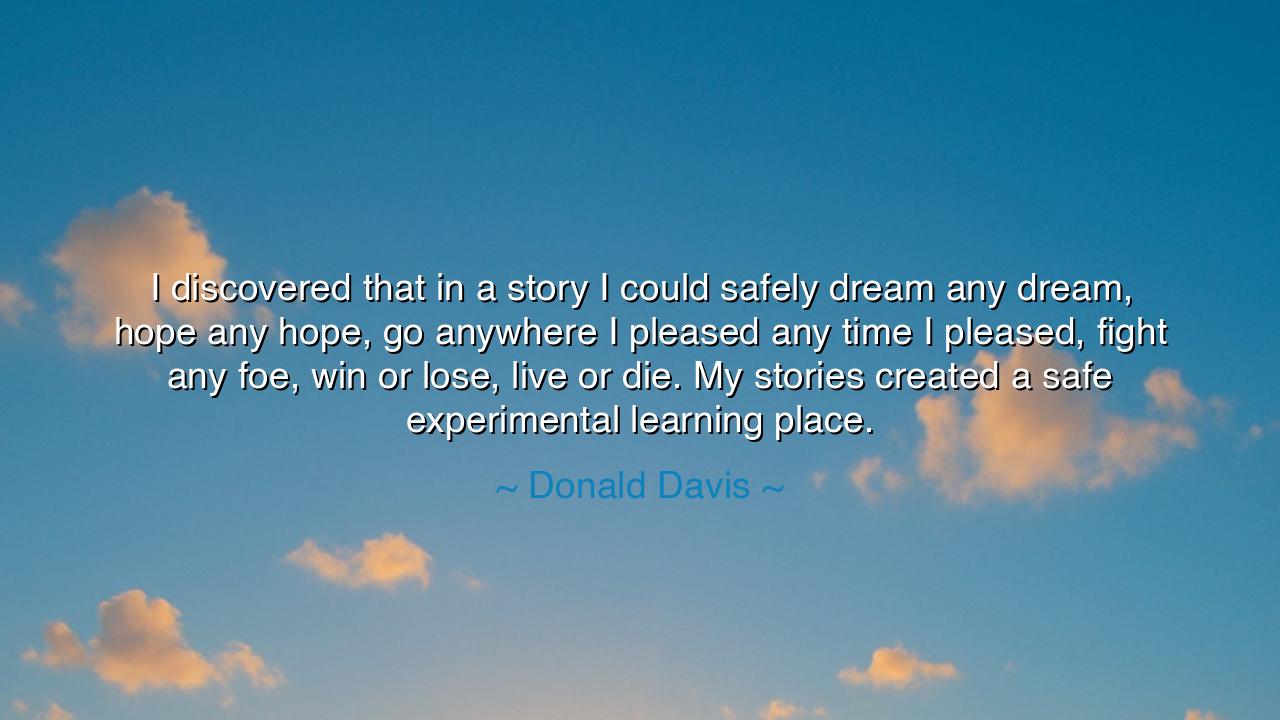
I discovered that in a story I could safely dream any dream, hope
I discovered that in a story I could safely dream any dream, hope any hope, go anywhere I pleased any time I pleased, fight any foe, win or lose, live or die. My stories created a safe experimental learning place.






In the quiet forge of the mind, Donald Davis declares: “I discovered that in a story I could safely dream any dream, hope any hope, go anywhere I pleased any time I pleased, fight any foe, win or lose, live or die. My stories created a safe experimental learning place.” Hear this as a teaching from the elders: a story is not mere ornament, but a sheltering fire where the soul rehearses its trials without the world’s full cost. Within its circle, we draw maps of peril and mercy; we test the hinges of our courage; we fail without being shattered; we succeed without becoming proud. Because the tale is bounded, the heart is freed.
The ancients knew this temple well. In epics and parables, they walked ahead of our feet so that our feet might walk more wisely. To safely dream is not to remain asleep; it is to wake inside a crafted world and see with clarified eyes. In a story, the traveler may go anywhere—across deserts of choice, through forests of consequence, over mountains of doubt—arriving not at a place on earth, but at a place in understanding. There, time bends: we enter any time—the youth we once were, the elder we may become—and we speak across the ages with our possible selves.
To fight any foe is to grapple with the true opponents: fear without name, desire without measure, anger without aim. The tale lends them faces and armor so that we may confront them. To win or lose in myth is to discover that both outcomes can tutor the spirit. Victory teaches limits; defeat teaches depths. And to live or die inside a narrative is to learn reverently that every choice carries a birth and a burial—the birth of one path, the burial of another—and that wisdom is the art of choosing with care.
Consider a lamp from history. As a young enslaved boy, Frederick Douglass found “The Columbian Orator,” a book of speeches and dialogues. Within those pages, he entered a safe experimental learning place: he argued for liberty when he could not yet claim it, practiced the cadence of freedom when the law denied his name. In that story-world he fought any foe—the lie that he was property, the despair that gnaws at shackles—and there he learned to win or lose in the arena of reason. When his hour came, the rehearsals of imagination had already toughened his courage and sharpened his voice. The book did not unlock his chains; it prepared the hand that would one day lift the key.
Or take a humbler scene, close at hand. A teacher invites her students to write alternate endings to a tragedy. One child gives the hero patience; another gives him a friend; a third gives him the strength to say “I was wrong.” In that classroom, no one is harmed, yet many are healed. The children cross the threshold of “what is” into “what might be,” and the mind, tasting possibility, becomes less a prisoner of impulse. This is the sacred technology of story: consequences without ruin, risks without wreckage, practice without penalty.
Do not mistake this for escape. The mission of such dreaming is returning. We go into the tale as sailors into a storm simulator—to learn how the keel complains, how the rudder answers, how the crew must sing together or drown apart. Then we come back to the wet world with steadier hands. When life brings its unscripted midnight, the drills we ran in narrative—the apologies we rehearsed, the refusals we practiced, the mercies we imagined—stand ready like tools in a belt.
Carry this lesson as a talisman: a well-chosen story is a companion and a coach. To live wisely, make time each week to enter that safe experimental learning place. Read a parable and rewrite its last page. Tell a family tale and ask what the hero might have tried differently. Keep a small notebook where you draft three responses—just three—to the next hard moment you fear. Gather with others to trade stories the way farmers trade seeds, and plant them in your days. For when the hour arrives to hope any hope, to fight any foe, to choose between win or lose, the world will not feel entirely new—you will have walked its contours in the lamp-lit halls of narrative. And there, in the quiet forge, you will have learned how to live or die with courage, and how to rise again with grace.






AAdministratorAdministrator
Welcome, honored guests. Please leave a comment, we will respond soon